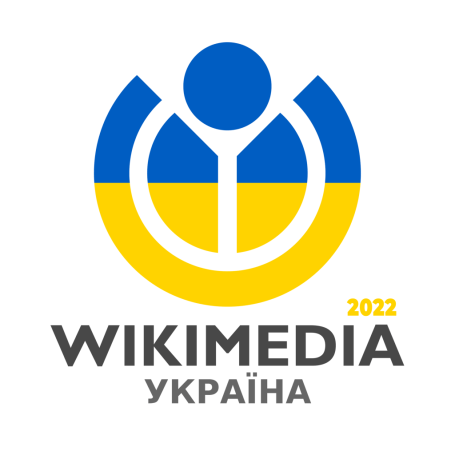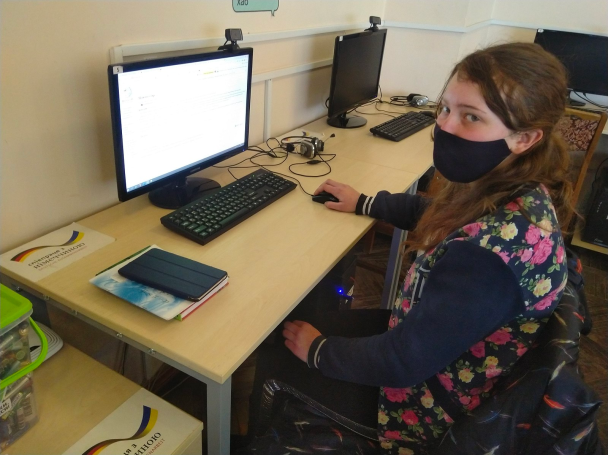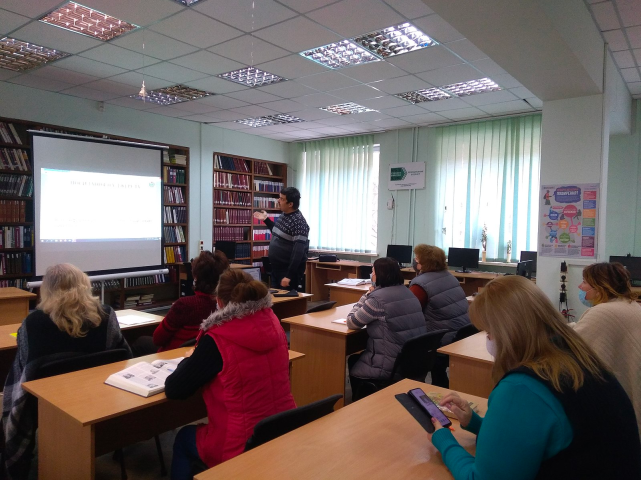Wikimedia Ukraine has been supporting Wikipedia and its sister projects since 2009. The past year was the most difficult in the history of independent Ukraine as we faced Russia’s invasion, but the Ukrainian wiki community and Wikimedia Ukraine have continued working to advance free knowledge in our country.
A detailed report about Wikimedia Ukraine’s work in 2022 will be published in February, but here’s a quick look at some highlights – some of the most notable projects and programs we implemented in the past year.
1. Supporting the community of volunteers during the war – and telling their stories
As Russia started a full-scale military invasion of Ukraine in late February of the last year, Wikimedia Ukraine has launched a program of supporting the local community – providing various kinds of assistance to the volunteers affected by the war. Many other organizations of the movement also contributed their efforts, whether hosting Ukrainians who’ve had to relocate abroad or providing material assistance.
The war is a source of countless stories of everyday resilience and ingenuity. That’s why we’ve also tried to tell as many as possible to the Wikimedia community, both in Ukraine and abroad. For example, we wrote about Viacheslav Mamon, who continued to edit Wikipedia from a bomb shelter since the first days of the war; user Wanderer777, who lived through the tragedy of Mariupol; or Anastasiia Petrova, who dedicated herself to volunteering on the ground 24/7 since the beginning of the invasion.
- Learn more: “2022 Russian invasion of Ukraine” portal on Meta-Wiki • full list of stories published by Wikimedia Ukraine
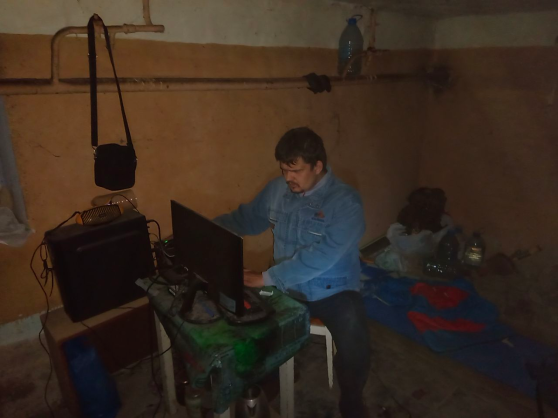
2. Ukraine’s Cultural Diplomacy Month – covering Ukraine in 60 languages
In February, together with the Ukrainian Institute and the Ministry of Foreign Affairs of Ukraine, we started Ukraine’s Cultural Diplomacy Month 2022 – the campaign that encouraged volunteers from across the world to create and improve articles about the culture and people of Ukraine in as many language editions of Wikipedia as possible (and also on Wikidata).
We hope to hold this campaign in 2023 again, but in the meanwhile everyone can enjoy the over 4,000 Wikipedia articles about Ukraine created or expanded in 60 languages thanks to the 2022 campaign.
- Learn more: “Ukraine’s Cultural Diplomacy Month 2022: Detailed Results” on Diff
3. Wiki Loves Monuments in Ukraine – almost 14,000 photos of Ukraine’s cultural heritage
Wiki Loves Monuments has traditionally been one of Wikimedia Ukraine’s largest projects. Part of the international competition, it aims to gather a database of freely licensed photos of Ukraine’s cultural heritage monuments for Wikimedia Commons. We’ve held the contest annually since 2012, and 2022 has been no exception.
For security reasons, we had to limit entries only to photos taken before the full-scale war. Still, the contest took place and gathered almost 14,000 pictures that depict over 5,300 monuments, including 351 monuments illustrated for the first time. Almost 300 people participated in the contest, including 177 newbies.
4. All-Ukrainian Wikimarathon to mark Ukranian Wikipedia’s birthday
January 30th is Ukrainian Wikipedia’s birthday. Every year we use this opportunity to organize Wikimarathon – an ambitious campaign that aims to recruit as many new volunteers as possible to Wikipedia. The idea is for everyone to present Wikipedia an article to celebrate its birthday.
Wikimarathon consists of an online campaign and a network of offline training sessions. Before the pandemic, we typically supported over 60 events in most of Ukraine’s 25 regions annually. In January 2022 – before the full-scale war but with COVID restrictions still in place – 30 local events took place. Overall, some 300 participants created 850 articles on Wikipedia.
5. Presenting Ukraine at Wikimania
In August, the whole movement gathered at Wikimania, the annual conference celebrating the Wikimedia community and free knowledge. In 2022, Ukraine was presented widely at the event.
We presented how Russia’s war in Ukraine impacted the wiki community in Ukraine and beyond; discussed how Ukrainians are preserving cultural heritage during the war; and prepared a video story on Ukrainian culture for Wikimania’s opening.
Besides, we held an offline gathering in Kyiv – the first opportunity for the local community to gather in-person since the all-out war started.
6. Wikiconference 2022 – online and in three cities
Every year we hold a conference for the community from across Ukraine to come together and discuss Wikipedia, wiki projects and free knowledge. In 2022, the conference was held for the twelfth time – this time, as four separate meetings in early October: one online and three gatherings in Ukraine’s major cities.
Some 50 people took part in the online day, and almost 50 participants joined in-person events. Wikipedia-co founder Jimmy Wales and Wikimedia Foundation CEO Maryana Iskander spoke at the conference’s opening. The main theme was the work of wikiprojects during the war, but we also made time for other important topics, such as technical training sessions or presenting news from the international Wikimedia movement.
- Learn more: brief video review of Wikiconference 2022
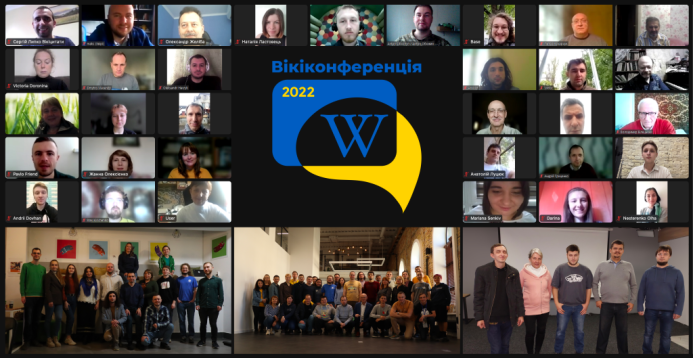
7. Wiki Loves Earth photo contest at the international stage
For almost a decade now, Wikimedia Ukraine has been organizing the Wiki Loves Earth photo contest dedicated to nature heritage. Founded in Ukraine, it went global in 2014.
Unfortunately, because of Russia’s invasion, we weren’t able to hold the local contest in Ukraine in 2022. However, the Ukrainian team continues its work to help support the competition on the international stage.
The international contest saw a record number of participating countries – 39. Wikimedia Commons got almost 50,000 new photos of nature protected areas by over 3,500 participants from across the world.
- Learn more: Wiki Loves Earth 2022 international winners
8. Helping improve Wikipedia through #1Lib1Ref
Twice a year, the #1Lib1Ref international campaign — abbreviated for one librarian, one reference — calls on librarians and everyone else to add missing references to articles on Wikipedia. In 2022 the Ukrainian community, with help from Wikimedia Ukraine, joined the campaign in both rounds: in January-February and in May-June.
Thanks to some 60 participants, almost 800 Ukrainian Wikipedia articles became better and more reliable as a result. In late January we supported a training session for librarians of the Kharkiv Korolenko State Scientific Library.
9. Campaigns to improve gender balance on Wikipedia and sister projects
An important part of Wikimedia Ukraine’s work is helping improve gender diversity on Wikipedia, Wikiquote and other Wikimedia projects.
In the spring of 2022, Ukrainian wiki volunteers created and improved almost a 1000 articles in our language on Wikipedia during WikiGap Challenge, and three Wikipedians from Ukraine made it into the top-10 most active participants. (Unfortunately, because of the war we weren’t able to hold events on the ground, as we had done in previous years).
In November, together with long-term partners we held the “She Did It” campaign on Ukrainian Wikipedia devoted to improving coverage of notable women. A sister campaign was also held on Ukrainian Wikiquote within the international #SheSaid campaign. Overall, the participants added another 800+ articles to these two wiki projects.
10. Educational collaborations: handbook for teachers, “Wikipedia for School” article contest, cooperation with universities
Ukrainian educators have had a hard time continuing to work amidst the invasion, but life and activity on Wikipedia went on. Notably, we finalized and published a handbook for Ukrainian teachers – a 100-page collection of advice, recommendations, and best practices from teachers who utilize Wikipedia at school.
We also supported the Education Program in specific schools and universities per request, including some of the biggest Ukrainian universities like the Taras Shevchenko National University of Kyiv and the Lviv Polytechnic.
Throughout the year, we finalized the results of “Wikipedia for School”, our regular article contests on Wikipedia (and this year also on Wikiquote) for school teachers devoted to school curricula subjects.
- Learn more: “Wikipedia for School” results • “Educational program & Wikivoyage in Ukrainian University” • story of one educator’s work during the war
This article was originally published on Wikimedia Ukraine’s blog in Ukrainian.

Can you help us translate this article?
In order for this article to reach as many people as possible we would like your help. Can you translate this article to get the message out?
Start translation
